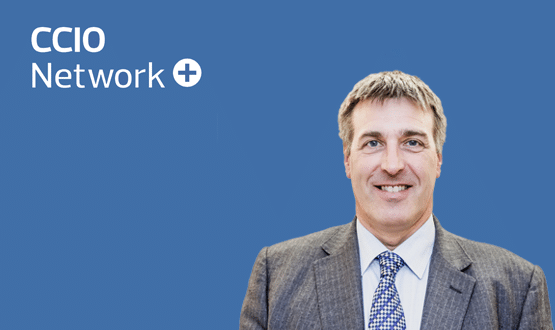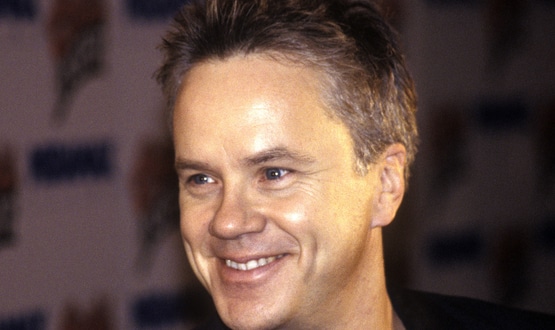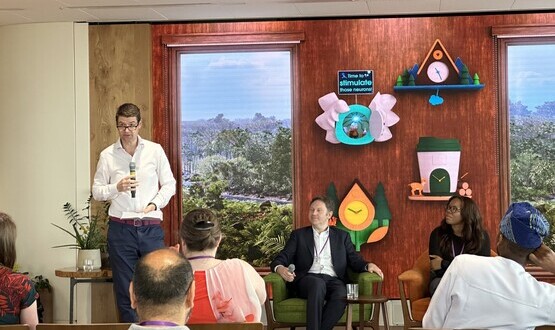The CCIO Interview: Roger Chinn, Chelsea and Westminster Hospital FT
- 9 April 2018

This week we are speaking to Roger Chinn, chief clinical information at Chelsea and Westminster Hospital NHS Foundation Trust. He explains why he feels clinicians and managers need to be joined at the hip to achieve system change, and why he has a problem with emails.
Why did you become an NHS CCIO?
Throughout my consultant career I have been involved in the development, implementation, adoption and optimisation of clinical information systems. I have also followed a path through medical leadership roles in my organisation so it was a natural progression to align the two.
Why do you think the role of CCIO is so important within the NHS?
I believe high level clinical leadership in IT is critical to ensuring any digital modernisation programme remains focused on its role as an enabler for better clinical outcomes. Without that clinical leadership, there is a risk that a patient-centric approach might easily be lost in the complexity of any programme.
Within your organisation, what is the most significant digital achievement of the past 12 months?
Persuading the trust to appoint a board level CIO. Without this appointment, the CCIO role would be extremely challenging, particularly as we move towards our EPR deployment across the trust. I am a firm believer that getting the people and the processes right is as important – if not more important – than the technology that enables them.
What will be the most significant challenge for the NHS over the next 12 months?
Weathering the impact of the NHS’s standard role as national political football. We are not out of the woods yet this winter and already the clouds are gathering for next winter. Escalating demand against capped resources and the ever-increasing workforce issues risk creating a perfect storm.
What’s the biggest barrier to being a more effective CCIO?
In the current climate, it is really hard to maintain focus on the process and behavioural changes required to deploy new digital solutions across the organisation. There are always more pressing calls upon the time of the clinical and operational staff. It is therefore a challenge to get the message across that investing in these changes now is necessary to deliver better care in the future.
What’s the biggest barrier the NHS faces overall in achieving digital transformation?
There is so much work still to do at a basic or foundational level to support to the achievement of higher order digital transformation.
So the NHS a whole has to be clear about where to start. Then we must stick to the plan and deliver what we said we do would, on time. Celebrate, then move onto the next step.
Taking a second bite at this: making sure we have 21st century clinical informatics and analytics power to process the volumes of data we capture about our patients. We need this to become information and knowledge we can use. There lies the path to better clinical outcomes.
Which piece of technology do you think will most help ease winter pressures on the NHS?
Whatever technology that provides real-time access to information that is relevant, joined up and timely. This is fundamental to improving the quality of care and hence performance under pressure. We need this capability across the whole health and social care ecosystem.
If you have one piece of advice for other NHS CCIOs, what would it be?
Don’t try to work alone. Harness your colleagues in operational roles; clinicians and managers need to be joined at the hip to achieve system change.
In addition, I have established divisional clinical information officer roles and a multidisciplinary clinical advisory group for IT. Everyone benefits from the matrix working and the transparency this affords us.
Who in the NHS do you admire the most and why?
Our frontline staff. They deliver unfailingly kind care to our patients day in, day out. It is easy to feel proud to represent them.
If you were given £30 million to spend on digital transformation within your trust, where would that money go?
Firstly, on better and more rapid integration of internal systems and interoperability with partner organisations.
Secondly on state of the art clinical informatics systems and the appropriate team to get information into the right hands.
What is the most over-hyped digital innovation in health?
Looking back, email is always a popular answer here. It really does seem to be the worst form of communication we have invented to date.
Currently, the frenzy around machine learning and AI needs to be tempered with some caution as we work out how best to harness the benefits in healthcare. It is a the top of the hype cycle and needs a sense check. No doubt I will eat these words in good time but prepare for disillusionment first.
Looking further forward, I think the concept of humanoid robotic nursing is one to be cautious about. Please let us not lose sight of the role human interactions play in the delivery of high quality healthcare.
What is the most under-rated digital innovation in health?
FHIR (Fast Healthcare Interoperability Resources and Application Programming Interfaces) will unlock the phenomenal potential currently sequestered in our systems. This will impact upon patient and staff experience in the imminent future.
At a patient level, smart insulin delivery pumps would have to be a contender as a life-changing transformative technology.
And a few non-digital questions: if you could invite three people, alive or dead, to dinner who would they be?
Richard Feynman, Leonardo Da Vinci, David Attenborough.
What’s the background image on your home computer?
It is an aerial view of an island archipelago in an almost abstract swirly tropical sea.
What’s your favourite piece of technology at home and why?
Smartphone. The combination of access to information, entertainment and communication tools at your fingertips is beguiling.
In a film of your life, who would play you?
Tim Robbins, since it seems he could make any story worth watching. It would take someone of his talent to sell any tickets to the show.






2 Comments
just for clarification, in MP&HO, “the cultural change that is required “within” the nhs is an acceptance that those who are following a technical career pathway are no less important than those that are are following a clinical or a managerial career pathway”
How about NHS techies, where do they fit in ?
Comments are closed.